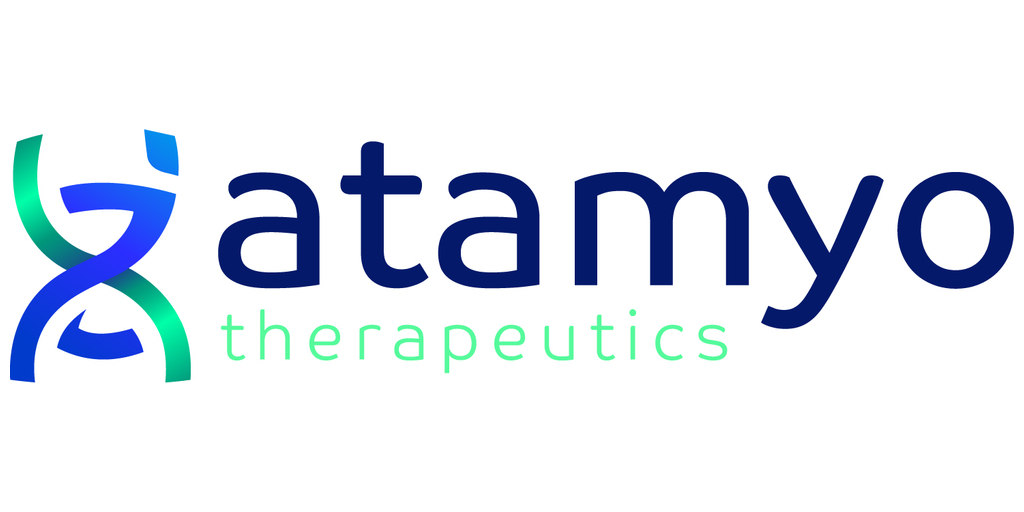- Completion of recruitment of patients in multicenter Phase 1b study evaluating pharmacodynamic and efficacy of ATA-100 in LGMD-2I/R9
- IND filed to evaluate safety, pharmacodynamic and efficacy of ATA-200 in US patients with LGMD-2C/R5
- Rare Pediatric Disease Designation awarded to ATA-200 from US FDA
EVRY, France--(BUSINESS WIRE)--In recognition of LGMD Awareness Day today, Atamyo Therapeutics a clinical-stage biotechnology company focused on the development of new generation gene therapies targeting muscular dystrophies and cardiomyopathies, announced the enrollment of the last patient in the dose-escalation phase of its Phase 1b clinical trial of ATA-100, a gene therapy for patients with limb-girdle muscular dystrophy Type 2I/R9 (LGMD-2I/R9, protocol code ATA-001-FKRP).
“The first patients dosed with ATA-100 have experienced promising functional results and the gene therapy has been overall well tolerated in all treated patients with no unexpected safety signal,” said Atamyo CEO and Co-Founder Stephane Degove. “Updated results of the clinical trial will be featured in an oral presentation at the 29th International Annual Congress of the World Muscle Society (WMS) in Prague, October 8 - 12, 2024.”
Atamyo also announced the filing of an Investigational New Drug (IND) application with the US FDA for a Phase 1b/2b clinical trial of its gene therapy, ATA-200, for patients with LGMD-2C/R5. The deployment in the US of Atamyo’s clinical trial of ATA-200 (NCT05973630) is funded by The Dion Foundation for Children with Rare Diseases.
The multicenter Phase1b open-label dose escalation study will evaluate safety, pharmacodynamics, efficacy, and immunogenicity in children receiving intravenous ATA-200, a single-dose Adeno-Associated Virus (AAV) vector carrying the human γ-sarcoglycan transgene. This study has already received regulatory clearance in France and Italy.
In addition, Atamyo announced the US FDA has awarded Rare Pediatric Disease Designation for ATA-200. The designation was requested based on the potential for ATA-200 to address an unmet medical need for LGMD-2C/R5, a serious and debilitating condition that affects children and leads to loss of ambulation before adulthood.
“We are thrilled to have completed the recruitment of the dose escalation phase of our Phase 1b study of ATA-100. Data of the dose escalation will serve at selecting the dose to carry over in the pivotal phase of the study,” said Sophie Olivier, MD, Chief Medical Officer of Atamyo. “We look forward to presenting the preliminary results of the first dose cohort at the forthcoming WMS Congress and at American Society of Gene & Cell Therapy’s Breakthroughs in Muscular Dystrophy Conference Nov. 19 – 20, 2024 in Chicago.”
LGMD-2I/R9 is a rare genetic disease caused by mutations in the gene that produces fukutin-related protein (FKRP). It affects an estimated 5,000 people in the US and Europe. In the most common form, symptoms appear around late childhood or early adulthood. Patients suffer from progressive muscular weakness leading to loss of ambulation. They are also prone to respiratory impairment. There is currently no curative treatment for LGMD2I/R9.
ATA-100, a single-administration gene therapy candidate for LGMD-2I/R9, delivers a normal copy of the gene for production of FKRP proteins. The therapy is based on the research of Atamyo Chief Scientific Officer Isabelle Richard, Ph.D., Research Director at CNRS who heads the Progressive Muscular Dystrophies Laboratory at Genethon.
LGMD-2C/R5 is a rare genetic disease caused by mutations in the gene that produces γ-sarcoglycan, a transmembrane protein that is involved in the connection between muscle fibers and their environment. It affects an estimated 2,000 people in Europe. In the classical form, symptoms appear in early childhood and patients suffer from progressive muscular weakness leading to loss of ambulation before adulthood. Cardiac involvement, typically presenting as dilated cardiomyopathy is reported in approximately half of patients. There is no curative treatment. The management of LGMD-2C/R5 is solely supportive.
ATA-200, the gene therapy for LGMD-2C/R5, delivers a normal copy of the gene for production of γ-sarcoglycan. In preclinical mice models, ATA-200 demonstrated its tolerability and capability to correct symptoms and biomarkers of the pathology. Atamyo plans to initiate dosing in patients for ATA-200 in the 4th quarter of 2024.
In addition to its LGMD-2C/R5 and LGMD-2I/R9 gene therapies, Atamyo is in IND-enabling studies for LGMD-2A/R1, which is related to deficiencies in calpain3 protein.
About Atamyo Therapeutics
Atamyo Therapeutics is a clinical-stage biopharma focused on the development of a new generation of effective and safe gene therapies for neuromuscular diseases. A spin-off of gene therapy pioneer Genethon, Atamyo leverages unique expertise in AAV-based gene therapy and muscular dystrophies from the Progressive Muscular Dystrophies Laboratory at Genethon. Atamyo’s most advanced programs address different forms of limb-girdle muscular dystrophies (LGMD), with two clinical-stage programs targeting respectively LGMD-R9 and LGMD-R5. The name of the company is derived from two words: Celtic Atao which means “Always” or “Forever” and Myo which is the Greek root for muscle. Atamyo conveys the spirit of its commitment to improve the life of patients affected by neuromuscular diseases with life-long efficient treatments. For more information visit www.atamyo.com
Contacts
U.S. Contact:
Charles Craig, Opus Biotech Communications
charles.s.craig@gmail.com, 404-245-0591
European contact: contact@atamyo.com






